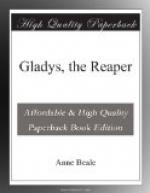Mrs Prothero took advantage of her husband’s approval of Gladys’s exterior to send her out into the garden in the evening to breathe the air, and afterwards into the fields. The girl’s strength gradually returned, but with it there appeared to be no return of youth or hope. A settled melancholy was in her countenance and demeanour; and when Netta rallied her on being so sad and silent, her reply was, ’Oh, miss, there is no more joy or happiness for me in this world! all I love have left it, and I am but a lonely wanderer and an outcast!’
When the shirts were finished, it was time to think of her departure, for she had exhausted all the sewing-work of the house. Mrs Prothero could not bear to turn the friendless, homeless girl adrift on the world. She ventured upon the subject one day at dinner.
’What will become of her, David? And she so beautiful! I declare I think I never saw a prettier girl.’
‘Well, mother, who will you call pretty next?’ said Owen, who had seen her once or twice by chance. ’Why, she has no more colour in her face than this tablecloth, and I don’t believe she has any eyes at all; at least, I never saw them; but I mean to try whether she has any some day, by making a frightful noise when she drops me that smart curtsey in passing.’
’I am sure we want hands badly enough in the wheat field, said Farmer Prothero. ’If the girl could pick up her crumbs a little by harvesting, you could keep her a while longer, and then send her off in search of her relations.’
‘Thank you, David. I will ask her what she can do,’ said Mrs Prothero.
‘Not much in that way, I am pretty sure,’ said Netta. ’How should those wretched Irish, who live on nothing but potatoes, know any thing about the wheat harvest?’
‘Treue for you there, my girl,’ said Mr Prothero, ’but I daresay mother will make believe that she knows something.
‘Mother’ found the object of their conversation that very evening in the wheat field, sitting under a tree, at work. She had sent her out for a walk, and this was her exercise. Owen and Netta were with their mother, and as they approached, Gladys rose, curtseyed, and was going away, when Owen made an unnatural kind of whistle, as if to frighten away some cows in the distance. Gladys started, and with a terrified face glanced at him. He found that she had very beautiful, violet eyes, with lashes so long and black, that when she looked to the earth again they made a strange contrast to her pale face.
‘What sad, uncomfortable eyes,’ thought Owen; ’I must have another glance at them by-and-by. If she had a colour she might be pretty, as mother says, but it makes one ill to look at her.’
‘Do you think,’ said Mrs Prothero, addressing Gladys, ’that you could manage to help in the harvest; My husband says he will employ you, if you can.’
’Oh, thank you, my lady! I would do my best, and if I could only stay here longer under any circumstances—I should—oh, be so thankful!’




